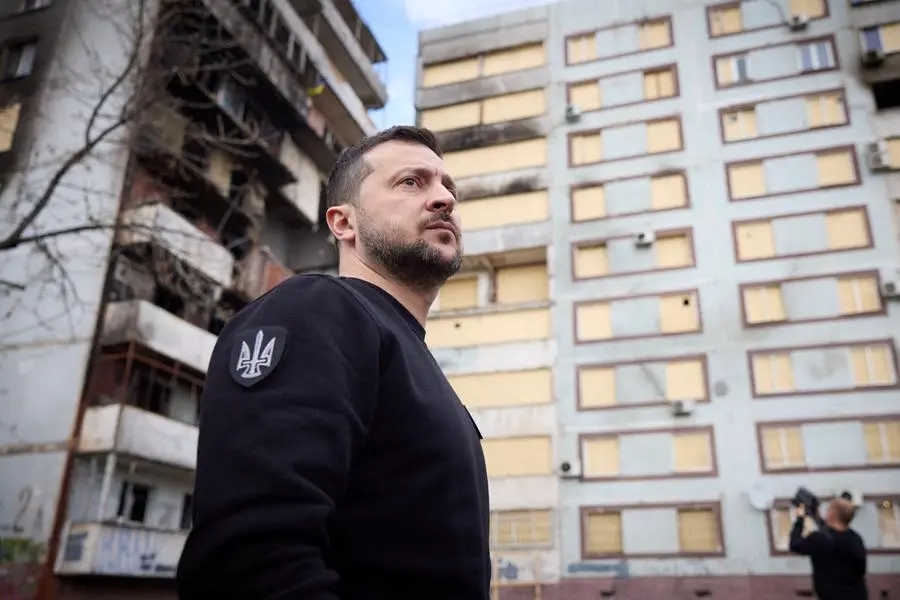PHOTO
Ukraine's president said Russian troops were holding the Zaporizhzhia nuclear plant "hostage" and its safety could not be guaranteed until they left it, while his forces shut off the frontline town of Avdiivka as they planned their next move.
Russian troops have occupied the nuclear power plant, Europe's largest, since the early weeks of the invasion of Ukraine and have shown no inclination to relinquish control.
"Holding a nuclear power station hostage for more than a year - this is surely the worst thing that has ever happened in the history of European or world-wide nuclear power," President Volodymyr Zelenskiy said in his nightly video address.
He decried the Russian presence as "radiation blackmail".
His comments followed a meeting with Rafael Grossi, the director general of the International Atomic Energy Agency (IAEA), at the Dnipro hydroelectric power station - northeast of the Zaporizhzhia plant.
Initiatives on restoring safety and security are "doomed to failure" without a withdrawal of Russian troops from the plant, Zelenskiy said in comments posted on the presidential website.
Russia and Ukraine routinely accuse each other of shelling the Zaporizhzhia plant. Fighting around it and worries of a water shortage and that cooling systems could lose power have raised fears of a nuclear disaster.
A team of IAEA experts has since September been stationed at the plant, which Kyiv has accused Moscow of using as a shield for troops and military hardware.
Grossi has repeatedly called for a safety zone around it and is due to visit it again this week. He has tried to negotiate with both sides but said in January that brokering a deal was getting harder.
Zaporizhzhia is one of four regions Russia claimed to annex in September after referendums criticised globally as shams. Russia views the plant as its territory, which Ukraine denies.
Zelenskiy visited the southeastern Zaporizhzhia region on Monday, the latest stage of a tour of frontline regions since a top general said Ukraine's counterattack could come soon.
TACTICAL NUCLEAR WEAPONS
Russian President Vladimir Putin's invasion, now into its 14th month, has been bogged down for months amid fierce fighting along the eastern front, where Ukraine's forces are trying to wear down the invaders before launching their own offensive.
In warnings to the West against continuing to arm Ukraine, Putin and other Russian officials have increasingly played up the risks of nuclear weapons being used in the war. On Saturday, Putin said he had struck a deal to station tactical nuclear weapons in neighbouring Belarus, an ally of Moscow.
Belarus's foreign ministry said on Tuesday it had agreed to host the nuclear weapons in order to protect itself after years of "unprecedented pressure" from the West. It said the move did not contravene international non-proliferation agreements.
Ukraine and its Western allies have denounced the plan.
Putin's war has devastated Ukrainian cities and towns, caused the deaths of thousands of people and forced millions more to flee their homes, while also sharply raising global food and energy prices and exacerbating tensions worldwide.
Russia's defence ministry said on Tuesday its navy had fired supersonic anti-ship missiles at a mock target in an exercise in the Sea of Japan, prompting Tokyo - a key Western ally - to warn of increased Russian military activity in the Far East region.
France will double its supplies of 155mm shells to Ukraine to about 2,000 a month, its defence minister said on Tuesday. Ukraine has said these shells are critical to its war effort.
Russian Energy Minister Nikolai Shulginov said that Ukrainian drone attacks posed a serious threat to Russia's key energy infrastructure. Moscow says it has foiled a number of attempted drone attacks by Ukraine in recent months.
Meanwhile Ukraine, which has not publicly acknowledged attacking targets inside Russia, said its air defences had shot down 12 drones near Kyiv on Monday and falling debris set a non-residential site ablaze. No casualties were reported.
'TERROR'
Russia launched a total of 15 Iranian-made Shahed drones overnight on Ukraine, the Ukrainian military said early on Tuesday, adding its forces had destroyed 14 of them.
"The logic of the Russians' actions is terror aimed at civilian infrastructure," Ukrainian presidential chief of staff Andriy Yermak said on Telegram about the drone attacks.
"It won't work, just like geopolitical blackmail."
On the battlefield, Russian forces appear to be focusing on Avdiivka, 90 km (55 miles) south of the devastated mining town of Bakhmut in Ukraine's eastern Donetsk region. Ukraine shut Avdiivka to civilians on Monday, with an official describing it as a "post-apocalyptic" wasteland.
The Ukrainian military has warned that Avdiivka could become a "second Bakhmut", which has been reduced to rubble in months of fighting described by both sides as a "meat grinder".
Denis Pushilin, the Russian-installed leader of the part of Donetsk region under Moscow's control, said on Tuesday Russian forces were still moving forward in Bakhmut despite fierce Ukrainian resistance. He said they had almost taken control of a metals plant on the western side of the Bakhmutka river.
His claims ran counter to Ukrainian and Western assertions that the situation in Bakhmut is stabilising as the Russian offensive falters.
Ukrainian forces reported repelling 62 Russian assaults along the eastern front over the past 24 hours. Reuters could not verify the battlefield reports.
(Reporting by Reuters bureaux, Ron Popeski and Elaine Monaghan; Writing by Himani Sarkar and Gareth Jones; Editing by Cynthia Osterman, Robert Birsel, Peter Graff)





















